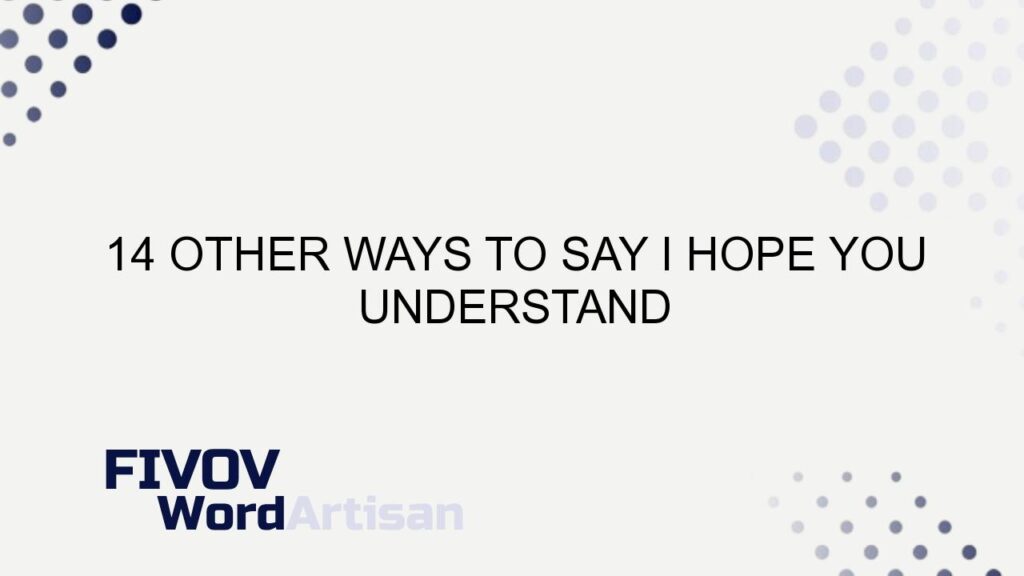Are you attempting to determine if something is feasible but find yourself needing to inquire first?
Maybe you’re concerned that the phrase “I hope you understand” might not be the most professional way to ascertain if an action can be undertaken.
MY LATEST VIDEOS
Well, you’ve come to the right place to find out more.
Other Ways to Say “I Hope You Understand”
Finding alternatives to the phrase “I hope you understand” can be beneficial in various professional and personal situations. Whether you are communicating in a business setting, resolving a misunderstanding, or trying to convey empathy, it’s essential to express yourself clearly and respectfully. Below are 14 alternative phrases to use in place of “I hope you understand”:
1. I trust you comprehend the situation.
2. I have faith in your understanding of this matter.
3. I believe you grasp the significance of this.
4. I am confident you see where I’m coming from.
5. I am counting on your understanding.
6. I am sure you perceive the implications.
7. I am hopeful that you are aware of the context.
8. I assume you acknowledge the gravity of the situation.
9. I anticipate that you have a clear understanding.
10. I imagine you are conscious of the implications.
11. I expect that you comprehend the gravity of this.
12. It is my belief that you understand the situation.
13. It is my expectation that you apprehend the circumstances.
14. It is my hope that you are aware of the implications.
Exploring and utilizing these alternatives can enhance your communication and underscore your professionalism in various contexts. Whether it’s a workplace interaction, a personal conversation, or a written communication, choosing an appropriate alternative to “I hope you understand” can contribute to conveying your message effectively and respectfully.
Why Finding Alternatives is Important
Effective communication is crucial in both professional and personal settings. The way we convey our thoughts, requests, or concerns can significantly impact the outcome of a conversation or interaction. In professional environments, using language that is clear, respectful, and professional is essential for maintaining positive relationships and achieving successful outcomes.
In scenarios where “I hope you understand” might seem dismissive, vague, or less professional, finding alternative phrases becomes crucial. It demonstrates thoughtfulness, respect for the other person’s perspective, and a willingness to communicate effectively. This can lead to smoother interactions, better understanding, and stronger relationships.
professional communication Alternatives
When it comes to professional communication, using phrases that convey respect, clarity, and professionalism is vital. Here are some alternative phrases to consider using in place of “I hope you understand” in professional contexts:
1. I trust that you are following my perspective.
2. I am counting on your insight into this matter.
3. It is imperative that you are aware of the implications.
4. Your understanding of this situation is crucial.
5. Your comprehension of the matter is greatly appreciated.
Choosing the right alternative for professional communication can enhance the clarity and professionalism of your message while fostering a respectful and conducive environment for effective communication.
Communicating Empathy and Understanding
In personal and empathetic communication, finding alternatives to “I hope you understand” can be equally important. Adjusting your language to express empathy and understanding can help in resolving misunderstandings and strengthening personal connections. Here are some alternative phrases suited for personal and empathetic communication:
1. I empathize with your point of view.
2. I understand where you are coming from.
3. I appreciate your perspective on this.
4. Your feelings on this matter are acknowledged and respected.
5. I resonate with your concerns and will address them accordingly.
Choosing the right words to convey empathy and understanding can foster stronger personal connections and facilitate effective communication in personal and emotional contexts.
Improving Communication Skills
Enhancing your communication skills involves being mindful of the words and phrases you use in various contexts. By expanding your repertoire of alternative phrases, you can improve your ability to convey your message clearly, respectfully, and professionally. Practicing and incorporating these alternatives into your communication can lead to more effective interpersonal interactions and better outcomes in professional and personal settings.
Using Alternative Phrases Effectively
Making the most of these alternative phrases involves understanding when and how to use them appropriately. Here are some guidelines for effectively using alternative phrases to “I hope you understand”:
1. Consider the context: Assess the nature of the situation and the level of formality before choosing an alternative phrase. Tailoring your language to the specific context can enhance the effectiveness of your communication.
2. Be mindful of tone: Pay attention to the tone you want to convey and select an alternative that aligns with the desired tone, whether it’s professional, empathetic, or diplomatic.
3. Emphasize clarity: Ensure that the chosen alternative maintains clarity in your communication. The goal is to express your message clearly while respecting the perspective of the other party.
4. Practice empathy: When communicating personally or empathetically, prioritize phrases that acknowledge and respect the other person’s feelings, perspectives, and concerns.
By incorporating these guidelines into your communication, you can effectively utilize alternative phrases to “I hope you understand” and improve the impact of your communication in various settings.
Enhancing Professionalism and Clarity
Utilizing alternative phrases to “I hope you understand” can contribute to enhancing the professionalism and clarity of your communication. Whether in formal business communications, personal interactions, or written correspondences, choosing the right language reflects your professionalism, respect for others, and commitment to effective communication.
By integrating these alternative phrases into your communication repertoire, you can elevate the quality of your interactions, foster understanding, and strengthen relationships, ultimately leading to more positive outcomes in both professional and personal spheres.
Conclusion
In your quest for effective and professional communication, finding alternatives to “I hope you understand” can significantly enhance the impact of your message. By considering the context, selecting appropriate alternatives, and practicing clarity and empathy, you can elevate your communication skills and foster positive interactions in various settings.
Remember, effective communication is a continuous learning process, and refining your language choices can lead to stronger, more impactful communication. Whether in professional or personal interactions, using alternative phrases thoughtfully and skillfully can contribute to building rapport, understanding, and successful outcomes.
Expand your communication toolkit with these alternative phrases and strive to communicate with clarity, empathy, and professionalism in every interaction.



